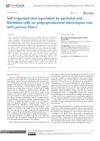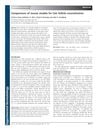 5 citations,
April 2021 in “Frontiers in Pharmacology”
5 citations,
April 2021 in “Frontiers in Pharmacology” Using minoxidil-coated microbubbles with ultrasound significantly boosts hair growth.
2 citations,
June 2022 in “Cells” 3D cell cultures are better for testing hair growth treatments than 2D cultures.
[object Object]  1 citations,
August 2024 in “Polymers”
1 citations,
August 2024 in “Polymers” Bacterial cellulose is a promising material for biomedical uses but needs improvements in antimicrobial properties and degradation rate.
 September 2023 in “Physiology and Pharmacology”
September 2023 in “Physiology and Pharmacology” Glucocorticoids can cause various health issues, but some treatments may help reduce these effects.
45 citations,
September 2001 in “Journal of Investigative Dermatology” Cyclosporin A promotes hair cell growth and affects protein kinase C levels.
17 citations,
September 2016 in “Stem cells translational medicine” Using bioreactors, scientists can grow more skin stem cells that keep their ability to regenerate skin and hair.
[object Object]  10 citations,
September 2022 in “Cellular and Molecular Life Sciences”
10 citations,
September 2022 in “Cellular and Molecular Life Sciences” SOX9 is essential for the development of various organs and hair follicles.
3 citations,
May 2013 in “International journal of molecular sciences” Epidermal stem cells show promise for treating orthopedic injuries and diseases.
 1 citations,
March 2022 in “IntechOpen eBooks”
1 citations,
March 2022 in “IntechOpen eBooks” Collagen is crucial for health and treating certain diseases, and supplements can improve skin, nails, and hair conditions.
 December 2024 in “Advanced Composites and Hybrid Materials”
December 2024 in “Advanced Composites and Hybrid Materials” Electrospun 3D nanofibrous materials show promise for bone regeneration in orthopaedics.

Intermittent fasting slows hair growth by damaging hair follicle cells.
 October 2023 in “Biomaterials”
October 2023 in “Biomaterials” Nanotechnology could improve hair regrowth but faces challenges like complexity and safety concerns.
 October 2022 in “Frontiers in Endocrinology”
October 2022 in “Frontiers in Endocrinology” New tools show that in fish, NPY increases feeding and somatostatin decreases it.
 15 citations,
January 1995 in “Archives of Dermatological Research”
15 citations,
January 1995 in “Archives of Dermatological Research” Minoxidil boosts elastin production, potentially helping skin diseases.
 18 citations,
June 2012 in “Archives of Dermatological Research”
18 citations,
June 2012 in “Archives of Dermatological Research” Vitamin D boosts a specific protein in skin cells linked to hair follicles.
 4 citations,
October 2017 in “Advances in tissue engineering & regenerative medicine”
4 citations,
October 2017 in “Advances in tissue engineering & regenerative medicine” Researchers created a potential skin substitute using a biodegradable mat that supports skin cell growth and layer formation.
 32 citations,
January 2005 in “Advances in Biochemical Engineering / Biotechnology”
32 citations,
January 2005 in “Advances in Biochemical Engineering / Biotechnology” Fetal wounds heal without scarring because of different biological factors, which could help improve adult wound healing.
 26 citations,
July 2012 in “Biochimica et Biophysica Acta (BBA) - General Subjects”
26 citations,
July 2012 in “Biochimica et Biophysica Acta (BBA) - General Subjects” The review found that different stem cell types in the skin are crucial for repair and could help treat skin diseases and cancer.
 24 citations,
August 2011 in “Experimental Dermatology”
24 citations,
August 2011 in “Experimental Dermatology” The flap assay grows the most natural hair but takes the longest, the chamber assay is hard work but gives dense, normal hair, and the patch assay is quick but creates poorly oriented hair with some issues.
 13 citations,
January 2021 in “Scientific Reports”
13 citations,
January 2021 in “Scientific Reports” Pannexin 3 helps skin and hair growth by controlling a protein called Epiprofin.
 4 citations,
January 2021 in “Archives of dermatological research”
4 citations,
January 2021 in “Archives of dermatological research” The study created a new model to better understand human hair growth and health.
 4 citations,
January 2017 in “Biological & pharmaceutical bulletin”
4 citations,
January 2017 in “Biological & pharmaceutical bulletin” Inhibiting ALOX12 can help hair cuticle maturation by increasing S100A3 citrullination.
 211 citations,
April 2018 in “Cold Spring Harbor Perspectives in Biology”
211 citations,
April 2018 in “Cold Spring Harbor Perspectives in Biology” Keratins are crucial for cell structure, growth, and disease risk.
 182 citations,
June 2017 in “Biomaterials”
182 citations,
June 2017 in “Biomaterials” Special fiber materials boost the healing properties of certain stem cells.
 79 citations,
March 1999 in “The journal of investigative dermatology/Journal of investigative dermatology”
79 citations,
March 1999 in “The journal of investigative dermatology/Journal of investigative dermatology” Procyanidin compounds from grape seeds were found to significantly increase mouse hair growth.
 71 citations,
January 2019 in “International journal of biological sciences”
71 citations,
January 2019 in “International journal of biological sciences” Exosomes from dermal papilla cells help hair growth by making hair follicle stem cells multiply and change.
 69 citations,
June 2017 in “Experimental Biology and Medicine”
69 citations,
June 2017 in “Experimental Biology and Medicine” Advanced human skin models improve drug development and could replace animal testing.
 54 citations,
April 2019 in “Journal of cellular physiology”
54 citations,
April 2019 in “Journal of cellular physiology” miR-218-5p helps skin and hair growth by targeting SFRP2 and activating a specific signaling pathway.
 54 citations,
November 2015 in “Methods in enzymology on CD-ROM/Methods in enzymology”
54 citations,
November 2015 in “Methods in enzymology on CD-ROM/Methods in enzymology” Keratins are important for skin cell health and their problems can cause diseases.
 47 citations,
July 2013 in “Pharmacological Reviews”
47 citations,
July 2013 in “Pharmacological Reviews” Regenerative pharmacology, which combines drugs with regenerative medicine, shows promise for repairing damaged body parts and needs more interdisciplinary research.


























